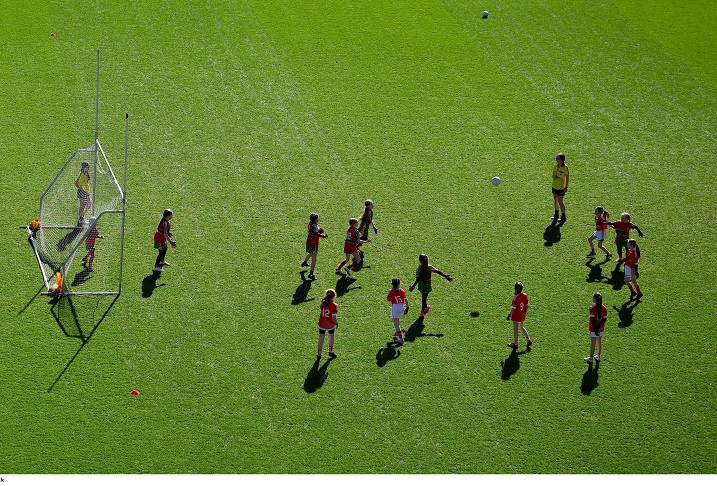By Gareth Fox
CROKE Park plan to clamp down on competitiveness for underage players up to 12 years of age.
As it stands, all games played at u-12 level and below will fall under the restriction of Go Games, intended to be ‘non-competitive’. No score-keeping, no knockouts, no finals, no winners, no losers.
Why? To keep more children playing the game – no winners, no losers, just play.
Sounds brilliant; the more participation in our sport, the healthier and more diverse our sport, the better our sport – in principle. But when such an extreme measure is taken, there has to be a major cause or worry.
If it’s to keep kids playing, then why are kids not currently playing? Is it really due to the winning and losing? Are kids really so devastated if they get beat?
If you go to most underage games around the country, you’ll find it’s not the kids who are struggling with winning or losing – it’s their coaches and parents.
Youth sports have long been hailed as an opportunity for children to develop essential life skills such as teamwork, discipline, and resilience. However, an increasing concern arises when parents and coaches become consumed by the sole pursuit of victory.
Let’s explore the potential difficulties that children may face when parents and coaches prioritise winning over the holistic development of young athletes.
1. Unrealistic Expectations: When parents and coaches place excessive emphasis on winning, they often set unrealistic expectations for young athletes. These expectations can lead to immense pressure and anxiety, as children feel compelled to meet lofty standards that may be beyond their current abilities. Consequently, the joy and enthusiasm that should accompany sports participation may diminish, resulting in a negative impact on their overall experience.
2. Lack of Enjoyment: Focusing solely on winning can overshadow the importance of enjoying the game. When children are consistently pushed to win, they may lose sight of the fundamental reasons they started playing sports in the first place. The absence of fun and enjoyment can erode their passion for the sport, leading to burnout and potentially causing them to abandon sports altogether.
3. Emotional Stress: Parents and coaches consumed by winning often create an environment that places a heavy emotional burden on young athletes. Constant criticism, harsh discipline, and an emphasis on perfection can lead to high levels of stress, anxiety, and even low self-esteem among children. The negative emotional impact can extend beyond the sporting arena, affecting various aspects of their lives.
4. Strained Relationships: Intense focus on winning can strain relationships between parents, coaches, and children. When adults prioritise victory over nurturing healthy relationships, communication breakdowns and conflicts become more prevalent. The child may feel overwhelmed, misunderstood, or unsupported, leading to a breakdown in trust and a diminished sense of security within their support network.
5. Limited Skill Development: While winning is undoubtedly a goal in competitive sports, an overemphasis on victory can hinder the overall skill development of young athletes.
A singular focus on winning often leads to neglecting the fundamentals, such as practicing technique, developing game intelligence, and fostering creativity. The long-term consequences of this approach may be detrimental to the child’s growth as an athlete.
6. Reduced Participation and Dropout Rates: When the primary focus is on winning rather than personal growth, the result can be higher dropout rates in youth sports. Children who feel overwhelmed or undervalued are more likely to disengage from sports, missing out on the numerous benefits these activities provide.
This reduction in participation can also limit opportunities for social interaction, physical fitness, and character development.
7. Lack of Sportsmanship and Ethical Values: When the sole emphasis is on winning, ethical values and sportsmanship often take a back seat. Children may witness cheating, poor sportsmanship, and aggressive behaviour, as parents and coaches prioritise victory above all else. This distorted focus can lead to a generation of athletes who prioritise winning at any cost, compromising the values of fair play, respect, and integrity
While winning is undoubtedly an important aspect of sports, it should not overshadow the holistic development of our young athletes. Parents and coaches have a crucial role in creating a nurturing environment that values personal growth, skill development and enjoyment.
By prioritising these aspects over a single-minded focus on victory, we can foster a love for our game, cultivate healthy relationships within our communities, and ensure that our young athletes thrive both on and off the field.
Parents, let us remember that youth sports should be about empowering children, not feeling good about yourself through them.
Pull quote
Receive quality journalism wherever you are, on any device. Keep up to date from the comfort of your own home with a digital subscription.
Any time | Any place | Anywhere












